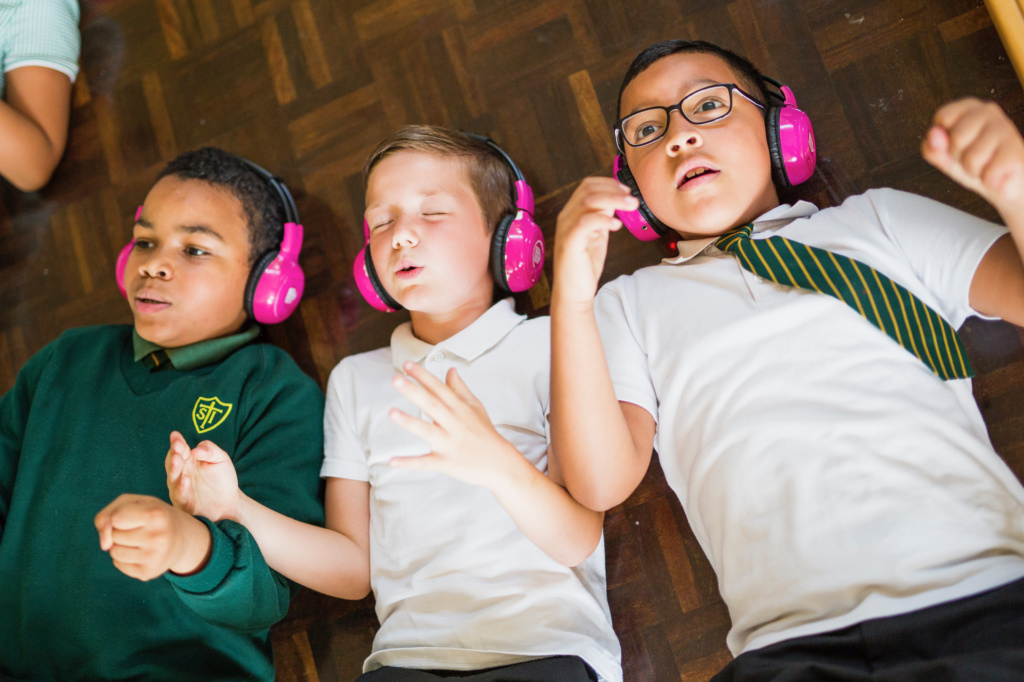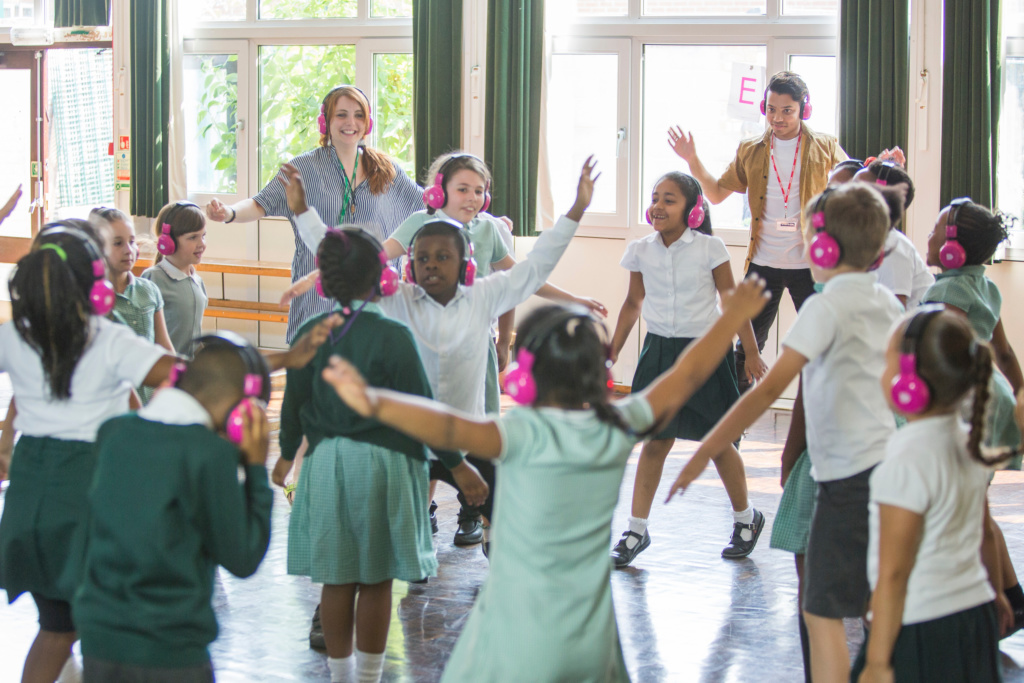
At now-press-play we are delighted when we receive testimonials such as this: ‘At times it looked like they had forgotten they were in school; they were so fixated on the storyline – living the role of the characters. Moreover, they were engrossed in valuable learning. I felt the strands of SMSC [Spiritual, Moral, Social and Cultural development] throughout; problem solving skills and drama led to an extremely active lesson.’ – Sean Hughes, Y6 Teacher, Coston Primary School.
Founded in 2012 by three friends who love learning but hate sitting down, our mission at now-press-play is to make learning accessible, engaging and active for all primary school children and to help every child fulfil their potential.
now-press-play is an immersive audio resource. It brings the curriculum to life for children through emotion, imagination and movement. Our approach empowers children to use their imagination and come up with innovative solutions. As they learn through play and movement, they see themselves as creators and problem solvers.
In Playing and Reality DW Winnicott said ‘It is in playing and only in playing that the individual child or adult is able to be creative and to use the whole personality. ‘
Immersive approach
We have taken this on board so a now-press-play Experience immerses children in an imaginary world via wireless headphones. These allow them to move around and take part in the story. This method of guided or constructive play lets them explore and process emotions in a safe and educational environment, as well as helping them with recall and information retention.
As a result, the child:
- Walks in someone else’s shoes
- Explores new, unusual locations
- Meets a variety of characters
- Experiences different challenges
- Finds ways to solve problems
- Engages with topics organically
- Develops their skills through playing

There are over 70 adventures and each interactive story is an exciting, rich and stimulating response to National Curriculum topics and learning objectives. This means now-press-play can be used seamlessly alongside normal teaching throughout the term.
But we’ve been wondering recently if these experiences could also develop children’s emotional skills and resilience, as well as giving them space to enjoy themselves and to cover different elements of the curriculum.
Earlier this year the Guardian highlighted that, ‘play will be essential to help relieve stress and anxiety among children’. This got us thinking about how our resource facilitates imaginative play and, through that, supports recovery and resilience.
Resilience and emotional understanding
In the University of Gloucestershire’s Summary Report ‘Play for a Change: Play, policy and practice: A review of contemporary perspectives’ 2015. Lester and Russell say: ‘Evidence suggests that play, as a unique behaviour, supports and enhances the development of resilience. Play offers the opportunity to create and resolve uncertainty, not so much when placing oneself in jeopardy but more in relation to feelings of excitement, courage and resilience in the face of imagined disaster (Spinka and others 2001; Sutton-Smith 2003).’
now-press-play helps children understand social context and scenarios. Through stories they can then explore how and why people react in certain ways and test out their own responses. For example, participating in our WW2 Experience, children develop empathy through pretending to be ‘another person’. This lets them talk about different situations or emotional states, identify with evacuees, and anyone who has been sent away from home, experience new problems and think about how they might create connections in uncertain times.
Development of Language Skills
Children learn by hearing the voices and language of adults around them and tend to imitate their style when playing. By engaging in imaginative play children can build on their existing vocabulary and develop communication skills. Teachers can support this by creating word banks for children to access pre/post an Experience.
OFSTED noted: ‘The use of auditory, digital reality is highly effective in engaging pupils. Pupils developed a raft of rich language, which they used to discuss how they felt during the different aspects of their journey. This inspired them to discuss their ideas before putting pen to paper.’ – OFSTED on now-press-play, St Luke’s Primary
The end of an Experience is a perfect opportunity to lead a discussion on how it made them feel and to see how it may link with other areas of their lives, as well as giving them the opportunity to talk about play and their creativity.
Often children become more vocal and talk in detail about their feelings: ‘It felt like you were in the problem and it gave me ideas of how I can help people if they are being bullied and support them in fixing the problem.’ – Y6 pupil, Robert Blair Primary
Experiential Learni ng
Carl Rogers’ experiential learning model claims that experiential learning addresses the needs and wants of learners through self-initiation and self-evaluation. Pupils need a personal involvement that will offer a purpose for learning and an emotional motivation to learn and that this in turn leads to a deeper understanding.
We offer this with our adventures: ‘Children of all ages and abilities are fully immersed in a dramatised version of a curriculum area ranging from a traditional tale, bullying, to a maths problem on board the Titanic! Through the experience the children are able to feel and learn at the same time which is incredible.’ – Ashley Booth, ICT Lead, Chisenhale Primary School, Tower Hamlets
A good example is our Fractions story where the main character is an orphan aboard the Titanic. In order to help friends and fellow passengers escape to safety pupils need to successfully complete a maths problem to work out how many people can go on each lifeboat. This means they are emotionally involved, have a direct purpose for applying their knowledge, and can evaluate if they’ve succeeded, and without realising it, they are learning the vital skills needed to work out fractions.
“I really liked it because it helps you learn when you’re having fun and you can understand things better when you’re solving mysteries.” – Y6 pupil, Prior Weston, Islington
Covid brings uncertainties into all of our lives so children are bound to have many anxieties and feelings that they may find difficult to verbalise or process. By using guided play and educational adventures such as our Experiences you can give the children in your school the opportunity to explore their emotions, build resilience and increase their problem solving skills. All of these will bring untold benefits.
Also See TeachingTimes’ Short Course On Building Resilience In Every Child
Register for free
No Credit Card required
- Register for free
- Free TeachingTimes Report every month